14933-76-7
| 中文名 | 3-乙基-2-甲基苯并唑对甲基苯磺酸酯 |
|---|---|
| 英文名 | 3-ethyl-2-methylbenzothiazolium p-toluenesulfonate |
| 中文别名 | 3-乙基-2-甲基苯并噻唑对甲苯磺酸酯 |
| 英文别名 |
3-ethyl-2-methylbenzothiazol-3-ium tosylate
3-Ethyl-2-methylbenzoxazolium p-Toluenesulfonate 3-ethyl-2-methylbenzothiazolium 4-toluenesulfonate 3-Aethyl-2-methyl-benzothiazolium,Toluol-4-sulfonat 2-methyl-3-ethyl-benzothiazolium tosylate 3-ETHYL-2-METHYLBENZOTHIAZOLINIUM P-TOLUE-NESULFATE EINECS 239-007-0 3-ethyl-2-methyl-benzothiazoliusaltwith4-methylbenzenesulfonicacid(1:1 3-ethyl-2-methyl-benzothiazolium,toluene-4-sulfonate 3-ethyl-2-methylbenzothiazolium p-toluenesulphonate 3-ethyl-2-methyl-benzothiazolium p-toluenesulfonate 3-Ethyl-2-methylbenzothiazolium p-toluensulfonate {CH3C7H4SNC2H5}{O3SC6H4CH3-p} |
| 密度 | 1.2505 (rough estimate) |
|---|---|
| 熔点 | 155ºC |
| 分子式 | C17H19NO3S2 |
| 分子量 | 349.46800 |
| 精确质量 | 349.08100 |
| PSA | 97.70000 |
| LogP | 4.49700 |
| 折射率 | 1.7000 (estimate) |
| 分子结构 | 1、摩尔折射率:无可用的 2、摩尔体积(cm3/mol):无可用的 3、等张比容(90.2K):无可用的 4、表面张力(dyne/cm):无可用的 5、介电常数:无可用的 6、极化率(10-24cm3):无可用的 7、单一同位素质量:349.080633 Da 8、标称质量:349 Da 9、平均质量:349.4677 Da |
| 计算化学 | 1、疏水参数计算参考值(XlogP):3.2 2、氢键供体数量:0 3、氢键受体数量:0 4、可旋转化学键数量:1 5、互变异构体数量: 6、拓扑分子极性表面积(TPSA);3.9 7、重原子数量:12 8、表面电荷:1 9、复杂度:160 10、同位素原子数量:0 11、确定原子立构中心数量:0 12、不确定原子立构中心数量:0 13、确定化学键立构中心数量:0 14、不确定化学键立构中心数量:0 15、共价键单元数量:1 |
| 更多 | 1.性状:未确定 2.密度(g/mL,25/4℃):未确定 3.相对蒸汽密度(g/mL,空气=1):未确定 4.熔点(ºC);155 5.沸点(ºC,常压):未确定 6.沸点(ºC,5.2kPa):未确定 7.折射率:未确定 8.闪点(ºC):未确定 9.比旋光度(º):未确定 10.自燃点或引燃温度(ºC):未确定 11.蒸气压(kPa,25ºC):未确定 12.饱和蒸气压(kPa,60ºC):未确定 13.燃烧热(KJ/mol):未确定 14.临界温度(ºC):未确定 15.临界压力(KPa):未确定 16.油水(辛醇/水)分配系数的对数值:未确定 17.爆炸上限(%,V/V):未确定 18.爆炸下限(%,V/V):未确定 19.溶解性:未确定 |
Synonym: Section 2 - COMPOSITION, INFORMATION ON INGREDIENTS
Risk Phrases: 34 Section 3 - HAZARDS IDENTIFICATION EMERGENCY OVERVIEW
Causes burns. Potential Health Effects Eye: Causes eye burns. Skin: Causes skin burns. Ingestion: May cause gastrointestinal irritation with nausea, vomiting and diarrhea. Inhalation: Dust is irritating to the respiratory tract. May cause respiratory tract irritation. Chronic: No information found. Section 4 - FIRST AID MEASURES Eyes: Flush eyes with plenty of water for at least 15 minutes, occasionally lifting the upper and lower eyelids. Get medical aid immediately. Skin: Get medical aid. Flush skin with plenty of water for at least 15 minutes while removing contaminated clothing and shoes. Wash clothing before reuse. Ingestion: If victim is conscious and alert, give 2-4 cupfuls of milk or water. Never give anything by mouth to an unconscious person. Get medical aid immediately. Inhalation: Remove from exposure and move to fresh air immediately. If not breathing, give artificial respiration. If breathing is difficult, give oxygen. Get medical aid. Notes to Physician: Section 5 - FIRE FIGHTING MEASURES General Information: As in any fire, wear a self-contained breathing apparatus in pressure-demand, MSHA/NIOSH (approved or equivalent), and full protective gear. During a fire, irritating and highly toxic gases may be generated by thermal decomposition or combustion. Extinguishing Media: Use agent most appropriate to extinguish fire. Use water spray, dry chemical, carbon dioxide, or appropriate foam. Section 6 - ACCIDENTAL RELEASE MEASURES General Information: Use proper personal protective equipment as indicated in Section 8. Spills/Leaks: Clean up spills immediately, observing precautions in the Protective Equipment section. Sweep up or absorb material, then place into a suitable clean, dry, closed container for disposal. Avoid generating dusty conditions. Provide ventilation. Section 7 - HANDLING and STORAGE Handling: Wash thoroughly after handling. Use with adequate ventilation. Minimize dust generation and accumulation. Avoid contact with eyes, skin, and clothing. Keep container tightly closed. Avoid ingestion and inhalation. Storage: Store in a tightly closed container. Store in a cool, dry, well-ventilated area away from incompatible substances. Section 8 - EXPOSURE CONTROLS, PERSONAL PROTECTION Engineering Controls: Use adequate ventilation to keep airborne concentrations low. Exposure Limits CAS# 14933-76-7: Personal Protective Equipment Eyes: Wear appropriate protective eyeglasses or chemical safety goggles as described by OSHA's eye and face protection regulations in 29 CFR 1910.133 or European Standard EN166. Skin: Wear appropriate protective gloves to prevent skin exposure. Clothing: Wear appropriate protective clothing to prevent skin exposure. Respirators: Follow the OSHA respirator regulations found in 29 CFR 1910.134 or European Standard EN 149. Use a NIOSH/MSHA or European Standard EN 149 approved respirator if exposure limits are exceeded or if irritation or other symptoms are experienced. Section 9 - PHYSICAL AND CHEMICAL PROPERTIES Physical State: Powder Color: yellow Odor: Not available. pH: Not available. Vapor Pressure: Not available. Viscosity: Not available. Boiling Point: Not available. Freezing/Melting Point: 155 deg C Autoignition Temperature: Not available. Flash Point: Not available. Explosion Limits, lower: Not available. Explosion Limits, upper: Not available. Decomposition Temperature: Solubility in water: Specific Gravity/Density: Molecular Formula: C17H19NO3S2 Molecular Weight: 349.46 Section 10 - STABILITY AND REACTIVITY Chemical Stability: Stable under normal temperatures and pressures. Conditions to Avoid: Incompatible materials, strong oxidants. Incompatibilities with Other Materials: Oxidizing agents. Hazardous Decomposition Products: Carbon monoxide, oxides of sulfur, irritating and toxic fumes and gases, carbon dioxide, nickel oxide. Hazardous Polymerization: Will not occur. Section 11 - TOXICOLOGICAL INFORMATION RTECS#: CAS# 14933-76-7 unlisted. LD50/LC50: Not available. Carcinogenicity: Benzothiazolium, 3-Ethyl-2-Methyl-, Salt with 4-Methylbenzene - Not listed by ACGIH, IARC, or NTP. Section 12 - ECOLOGICAL INFORMATION Section 13 - DISPOSAL CONSIDERATIONS Dispose of in a manner consistent with federal, state, and local regulations. Section 14 - TRANSPORT INFORMATION IATA Shipping Name: CORROSIVE SOLID, N.O.S.* Hazard Class: 8 UN Number: 1759 Packing Group: II IMO Shipping Name: CORROSIVE SOLID, N.O.S. Hazard Class: 8 UN Number: 1759 Packing Group: II RID/ADR Shipping Name: CORROSIVE SOLID, N.O.S. Hazard Class: 8 UN Number: 1759 Packing group: II Section 15 - REGULATORY INFORMATION European/International Regulations European Labeling in Accordance with EC Directives Hazard Symbols: C Risk Phrases: R 34 Causes burns. Safety Phrases: S 26 In case of contact with eyes, rinse immediately with plenty of water and seek medical advice. S 28A After contact with skin, wash immediately with plenty of water. S 37 Wear suitable gloves. S 45 In case of accident or if you feel unwell, seek medical advice immediately (show the label where possible). WGK (Water Danger/Protection) CAS# 14933-76-7: No information available. Canada CAS# 14933-76-7 is listed on Canada's NDSL List. CAS# 14933-76-7 is not listed on Canada's Ingredient Disclosure List. US FEDERAL TSCA CAS# 14933-76-7 is listed on the TSCA inventory. SECTION 16 - ADDITIONAL INFORMATION N/A |
|
~% 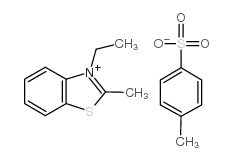
14933-76-7 |
| 文献:Oliveira, Anabela S.; Almeida, Paulo; Ferreira, Luis Filipe Vieira Collection of Czechoslovak Chemical Communications, 1999 , vol. 64, # 3 p. 459 - 473 |
|
~99% 
14933-76-7 |
| 文献:Hoechst Aktiengesellschaft Patent: US4966828 A1, 1990 ; |
| 上游产品 3 | |
|---|---|
| 下游产品 10 | |
| 海关编码 | 2934999090 |
|---|---|
| 中文概述 | 2934999090. 其他杂环化合物. 增值税率:17.0%. 退税率:13.0%. 监管条件:无. 最惠国关税:6.5%. 普通关税:20.0% |
| 申报要素 | 品名, 成分含量, 用途 |
| Summary | 2934999090. other heterocyclic compounds. VAT:17.0%. Tax rebate rate:13.0%. . MFN tariff:6.5%. General tariff:20.0% |


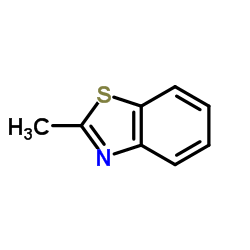
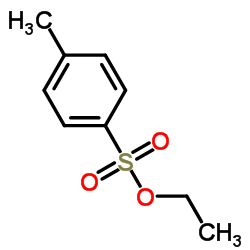
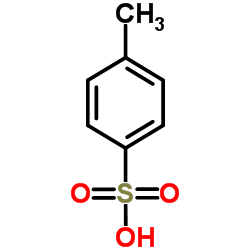
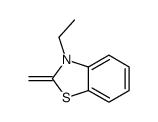
![3-ethyl-2-[(E)-(3,5,5-trimethylcyclohex-2-en-1-ylidene)methyl]-1,3-benzothiazol-3-ium,iodide结构式](https://image.chemsrc.com/caspic/427/34685-93-3.png)

![2-[(5-(AMINOCARBONYL)-3-([3-ETHYL-1,3-BENZOTHIAZOL-2(3H)-YLIDENE]METHYL)-2-CYCLOHEXEN-1-YLIDENE)METHYL]-3-ETHYL-1,3-BENZOTHIAZOL-3-IUM IODIDE结构式](https://image.chemsrc.com/caspic/184/34719-10-3.png)
![3-ETHYL-2-[(3-([3-ETHYL-1,3-BENZOTHIAZOL-2(3H)-YLIDENE]METHYL)-2,5,5-TRIMETHYL-2-CYCLOHEXEN-1-YLIDENE)METHYL]-1,3-BENZOTHIAZOL-3-IUM IODIDE结构式](https://image.chemsrc.com/caspic/456/70677-52-0.png)

![2-[2-(3-ethyl-1,3-benzothiazol-2-ylidene)ethylidene]cyclohexan-1-one结构式](https://image.chemsrc.com/caspic/060/88340-49-2.png)
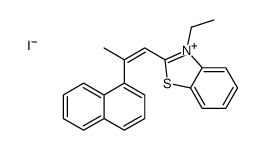
![3-ETHYL-2-((E)-2-[5-((Z)-2-[3-ETHYL-1,3-BENZOTHIAZOL-2(3H)-YLIDENE]ETHYLIDENE)-2H-PYRAN-3(6H)-YL]ETHENYL)-1,3-BENZOTHIAZOL-3-IUM IODIDE结构式](https://image.chemsrc.com/caspic/288/59170-49-9.png)
![3-([3-ETHYL-1,3-BENZOTHIAZOL-2(3H)-YLIDENE]METHYL)-5-(3-METHYL-5-OXO-1-PHENYL-1,5-DIHYDRO-4H-PYRAZOL-4-YLIDENE)-3-CYCLOHEXENE-1-CARBOXAMIDE结构式](https://image.chemsrc.com/caspic/381/54118-06-8.png)